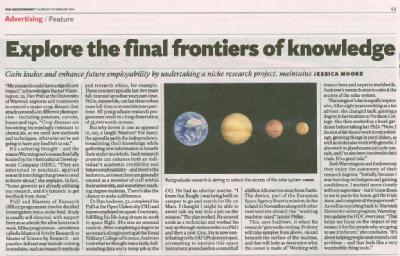Life Sciences News
See our Latest Journal Publications
Sprout science
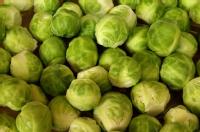 On Monday 18 December, Dr Guy Barker spoke on BBC Midlands Today on how Warwick Crop Centre are improving sprouts through traditional plant breeding. Watch www.bbc.co.uk/iplayer/episode/b09jg8fl/midlands-today-evening-news-18122017 (from 23 minutes)
On Monday 18 December, Dr Guy Barker spoke on BBC Midlands Today on how Warwick Crop Centre are improving sprouts through traditional plant breeding. Watch www.bbc.co.uk/iplayer/episode/b09jg8fl/midlands-today-evening-news-18122017 (from 23 minutes)
Dr Barker also spoke with Phil Upton on BBC Coventry and Warwickshire, describing how researchers are utilising genetic diversity from the UK Vegetable Genebank to enhance the appearance, quality and resistance of sprouts. Listen at www.bbc.co.uk/programmes/p05nlj64 (1:41-1:45)
SLS Researchers on Television
Two of our researchers recently featured on television programmes showcasing their expertise:
On 12 June, Virologist Professor Andrew Easton appeared on Channel 4’s ‘How to Stay Well’ programme, ‘Sneezes, Mobiles & Lyme Disease’, investigating how far a sneeze travels.
www.channel4.com/programmes/how-to-stay-well/on-demand/65113-001
On 19 June, Experiment Manager Andy Jukes, from Warwick Crop Centre, was on BBC One’s ‘Supermarket Secrets’ discussing the testing of chilli heat with Greg Wallace.
www.bbc.co.uk/iplayer/episode/b08w8r98/supermarket-shopping-secrets-series-1-1-war (42:28-46:39).
Countering the Courgette Crisis
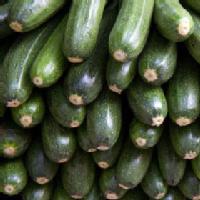 It seems we are facing a Courgette Crisis. Although it’s really just a bit of a run on green vegetables, it does remind us that actually, courgettes – and now iceberg lettuce – shouldn’t be ‘February vegetables’. This raises some important issues about what we as consumers have learned to expect when it comes to food.
It seems we are facing a Courgette Crisis. Although it’s really just a bit of a run on green vegetables, it does remind us that actually, courgettes – and now iceberg lettuce – shouldn’t be ‘February vegetables’. This raises some important issues about what we as consumers have learned to expect when it comes to food.
Researchers at Warwick Crop Centre are looking at ways of improving existing UK vegetable and fruit crops as well as looking for completely new ones.
BRAVO: making Brassica crops more resilient
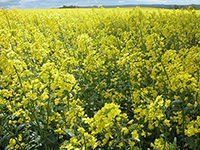 Protecting the UK’s most valuable crops by making them more resilient is at the heart of a new five-year project, in which the School of Life Sciences will play a key role.
Protecting the UK’s most valuable crops by making them more resilient is at the heart of a new five-year project, in which the School of Life Sciences will play a key role.
The Brassica, Rapeseed and Vegetable Optimisation (BRAVO) project, funded by the Biotechnology and Biological Sciences Research Council (BBSRC), aims to combat losses of Oilseed rape and Brassica vegetable crops by unravelling the processes that control key aspects of plant development.
Read Press Release
Warwick Crop Centre Joins Historic Tractor Parade
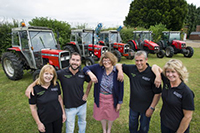 Staff and students from Warwick Crop Centre took part in the ‘70 tractors for 70 years’ Massey Ferguson procession organised by Coventry Transport Museum on Saturday 30 July.
Staff and students from Warwick Crop Centre took part in the ‘70 tractors for 70 years’ Massey Ferguson procession organised by Coventry Transport Museum on Saturday 30 July.
The Elizabeth Creak Charitable Trust and the School of Life Sciences
The School of Life Sciences welcomes Professor Murray Grant, who recently took up the position of Elizabeth Creak Chair in Food Security and, thanks to a generous donation from the Elizabeth Creak Charitable Trust, researchers teach children about soil at the Kenilworth Show.
Summer research placements in Entomology and Pathology
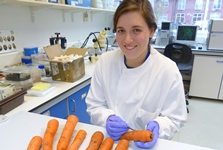 The School of Life Sciences has a number of summer research placements available in Entomology and Plant Pathology during the summer vacation of 2016. The placements are funded by the BBSRC through its Strategic Training Awards for Research Skills (STARS) scheme and provide training in strategically important and vunerable skills for bioscientists.
The School of Life Sciences has a number of summer research placements available in Entomology and Plant Pathology during the summer vacation of 2016. The placements are funded by the BBSRC through its Strategic Training Awards for Research Skills (STARS) scheme and provide training in strategically important and vunerable skills for bioscientists.
The 10-week placements are for second year undergraduate students enabling them to join a research group in Life Sciences and undertake a small research project related to the group's activities.
Each student will receive a bursary of £2000 (£200 per week).
For further details and how to apply see the Summer research placements flyer (pdf).
The closing date for applications is 18 April.
BBSRC Press Release 'First STARS awards target vunerable skills in the life sciences'
Plant science collaboration with Brazil to improve vegetable crops
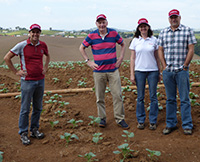 Dr John Walsh
Dr John Walsh , Associate Professor in the School of Life Sciences, and his collaborators have been awarded £15,000 for a research project on the characterisation of Potyviruses infecting vegetable crops in Brazil. The project was funded through the FAPESP SPRINT
, Associate Professor in the School of Life Sciences, and his collaborators have been awarded £15,000 for a research project on the characterisation of Potyviruses infecting vegetable crops in Brazil. The project was funded through the FAPESP SPRINT scheme (São Paulo Researchers in International Collaboration), which aims to encourage and promote the advancement of scientific research through partnerships between researchers in São Paulo State and overseas. The University of Warwick is one of only five UK institutions that has partnered with the São Paulo Research Foundation (FAPESP) to support this scheme.
scheme (São Paulo Researchers in International Collaboration), which aims to encourage and promote the advancement of scientific research through partnerships between researchers in São Paulo State and overseas. The University of Warwick is one of only five UK institutions that has partnered with the São Paulo Research Foundation (FAPESP) to support this scheme.
Dr Walsh’s project will be carried out in collaboration with Prof Elliot Kitajima from the University of São Paulo’s Department of Plant Pathology and Nematology in Piracicaba and Dr Marcelo Eiras from the Instituto Biologico in São Paulo. Initial activities to develop this partnership were supported by the University of Warwick’s Brazil Partnership Fund in 2014. The Brazilian operation of the commercial seed company Sakata are also involved in the research programme.
Potyviruses cause significant losses in agricultural, pastoral, horticultural and ornamental crops. This project focusses on Turnip mosaic virus (TuMV), which causes diseases in the economically important brassica family of crops including broccoli, cauliflower, cabbage, turnip and oilseed rape. Through determining the diversity of TuMV and investigating broad-spectrum resistance to the virus the team is expecting to identify naturally occurring resistance genes which can then be introduced into commercial crop lines. The collaboration brings together complementary expertise in plant science research which will lead to significant synergies and knowledge exchange, but also has the potential to generate substantial societal and economic benefits through collaboration with industry and the resulting exploitation of intellectual property.
HDC funded PhD student discusses issues facing the daffodil industry with Midlands Today
 James Syrett, an HDC funded PhD student from the Warwick Crop Centre discusses issues facing the daffodil Industry with BBC Midlands Today
James Syrett, an HDC funded PhD student from the Warwick Crop Centre discusses issues facing the daffodil Industry with BBC Midlands Today ![]() (24th March) and BBC Radio 4, Farming Today
(24th March) and BBC Radio 4, Farming Today ![]() (25th March). The price of a bunch of daffodils has remained fixed for a number of years despite significantly rising production costs.
(25th March). The price of a bunch of daffodils has remained fixed for a number of years despite significantly rising production costs.
His research project is looking at identifying technologies and growing practices to maintain the industry’s profitability.
Learn more about your vegetables
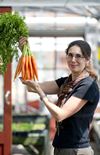 On Tuesday 6 January, Dr Charlotte Allender from Warwick Crop Centre shared her vegetable knowledge with BBC Coventry and Warwickshire's Phil Upton.
On Tuesday 6 January, Dr Charlotte Allender from Warwick Crop Centre shared her vegetable knowledge with BBC Coventry and Warwickshire's Phil Upton.
Listen on iPlayer at http://www.bbc.co.uk/programmes/p02fqlqy (from approx 2:17)
Getting agricultural information to smallholder farmers can help improve food security
BBSRC-funded PhD student Andrew Tock, from Warwick Crop Centre, explores 'plant clinics' in Uganda where farmers can receive objective and impartial advice on how to best treat their crops to protect them from pests. The diary is based on a three-month project in Uganda, and part of the Midlands Integrative Biosciences Training Partnership (MIBTP), a BBSRC-funded Doctoral Training Partnership. Find out more in Andy's blog.
Video courtesy of BBSRC
Legacy of Warwickshire’s first Woman High Sheriff helps University of Warwick tackle global food security
A trust set up by Elizabeth Creak, a leading Warwickshire farmer who was the first woman to be High Sheriff of Warwickshire, has announced that it has agreed to fund a Chair in Food Security at the University of Warwick’s School of Life Sciences. The announcement has just been made by The Elizabeth Creak Charitable Trust.
Warwick Crop Centre secure Defra contract to store 14,000 crop seed samples
Warwick Crop Centre at the University of Warwick has won a five year contract from Defra to continue to host the UK Vegetable Genebank at the University’s Wellesbourne campus.
The Genebank is an internationally significant collection of almost 14,000 seed samples from different vegetable crops including carrot onion, lettuce cauliflower, cabbage and broccoli and closely related wild species.
The collection represents the genetic diversity in the genepool of each crop, and is a vital resource for researchers and plant breeders across the world.
'Vegetables are an important component of a healthy diet and the seed resources within the Genebank will support the development of new and improved varieties in the future', said Dr Charlotte Allender who leads the Vegetable Genebank project.
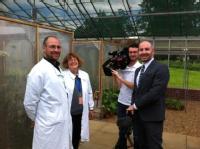 BBC's David Gregory visited the Warwick Crop Centre to film activities in the GRU (Genetic Resources Unit). The film is now available on You Tube at http://youtu.be/b9AmQ8wZvKg
BBC's David Gregory visited the Warwick Crop Centre to film activities in the GRU (Genetic Resources Unit). The film is now available on You Tube at http://youtu.be/b9AmQ8wZvKg
Useful links:
Warwick Crop Centre
Genetic Resources Unit
Exploring the final frontiers of knowledge...
Rachel Warmington, a second year PhD student at Warwick Crop Centre was featured in The Independent on Wednesday 20th February. The article by Jessica Moore entitled ‘Explore the final frontiers of knowledge’ shows how postgraduates undertaking niche research projects can affect real change:
‘My research could have a significant impact’, acknowledges Rachel Warmington, 34. Her PhD at the University of Warwick explores soil treatments to control a major crop disease that attacks around 400 different plant species – including potatoes, carrots, beans and rape. ‘Crop diseases are becoming increasingly resistant to chemicals, so we need new methods and techniques, otherwise we’re not going to have any food left to eat.’
Rachel, who is funded by the Horticultural Development Company (HDC), was recently awarded the Marsh Horticultural Science Award for 2013. The Award, run in partnership with the Royal Horticultural Society, recognizes the work of and encourages new postgraduate scientists to develop careers in horticultural science.
Click on image to read full article.
Chilli Heat Testing using Chromatography - Andy Jukes on CBBC Programme, Blue Peter
 Analytical chemist Andy Jukes, from Warwick Crop Centre, describes the analysis of heat in chillis using liquid chromatography on the CBBC Programme, Blue Peter (starts at 12:43).
Analytical chemist Andy Jukes, from Warwick Crop Centre, describes the analysis of heat in chillis using liquid chromatography on the CBBC Programme, Blue Peter (starts at 12:43).
Crop Centre engages with local school
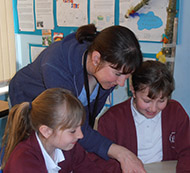 Ann Price from Warwick Crop Centre, part of the School of Life Sciences, went to Hampton Lucy School on Tuesday 7th May to give a talk to years 5 and 6 about her work in the Genetic Resources Unit. The Warwickshire primary school children learned about vegetable seeds, pollination and growing plants. The children really enjoyed Ann’s talk, and it fitted in well with their horticulture lessons and their vegetable garden work.
Ann Price from Warwick Crop Centre, part of the School of Life Sciences, went to Hampton Lucy School on Tuesday 7th May to give a talk to years 5 and 6 about her work in the Genetic Resources Unit. The Warwickshire primary school children learned about vegetable seeds, pollination and growing plants. The children really enjoyed Ann’s talk, and it fitted in well with their horticulture lessons and their vegetable garden work.
The School of Life Sciences is committed to working with schools and the community. Coordinated by our Educational Strategy and Communications Officer, staff and students from the School work with schools and the community to provide experience of the Life Sciences.
To find out more about what we can offer your school or community group contact life.sciences@warwick.ac.uk
Related links:
Schools and Community
Warwick Crop Centre
Genetic Resources Unit
Testing the heat of chillis
Analytical chemist Andy Jukes, from Warwick Crop Centre, describes the analysis of heat in chillis on the BBC Radio 4 Food Programme 'Chilli Britannia'.
Broadcast on Sunday 14 April 2013.
BBC Radio 4 visits Warwick Crop Centre
On Friday 12 August, BBC Radio 4’s Farming Today programme visited the Warwick Crop Centre to find out about research to increase vegetable yields, and quality, in the face of increasing pressures on climate change and food security.
The programme includes:
- Dr Rosemary Collier investigating sources of resistance to lettuce pests.
- Dr Charlotte Allender discussing the use of carrot diversity sets to look for useful traits such as disease resistance and tolerance to drought.
- Dr Graham Teakle examining nitrogen-use efficiency in oil seed rape.
Listen to the programme on BBC iPlayer
Find out more about Warwick Crop Centre

